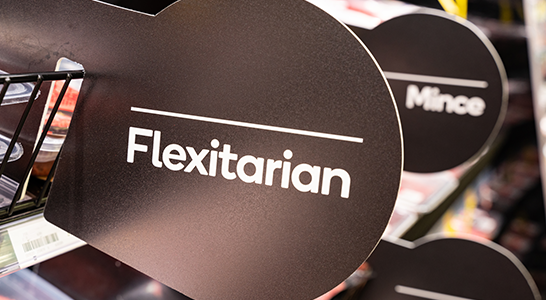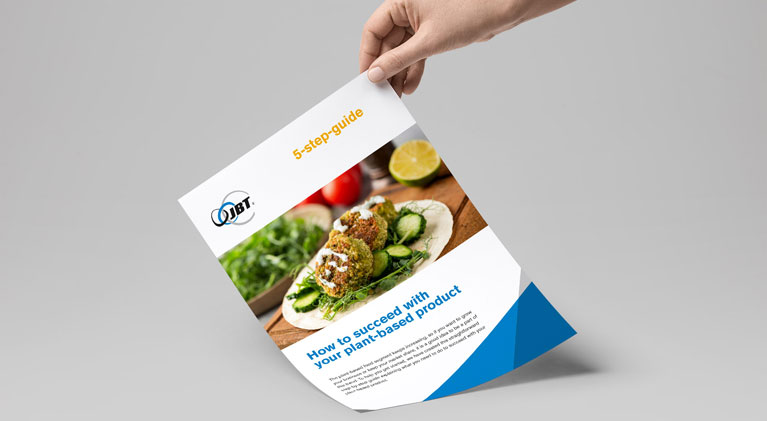When transitioning into plant-based products, it is vital to understand what drives people to choose vegan or vegetarian alternatives. According to a study carried out by Euromonitor1, 23% of the consumers claim that they are trying to limit their meat intake. Health is the primary motivator, and 37 % say that they eat meat alternatives to feel healthier. Environmental concern is also a key factor, and 21 % cite this as a reason for consuming plant-based protein. The critical consumer of plant-based food is the younger generation. Three out of four of the 15-29-year-olds say that they eat meat alternatives, compared to half of those aged 60+.
The reason behind not eating plant-based products is often a matter of price and taste. In the packaged food space, plant-based products are significantly more expensive than their animal-based counterparts. The taste and textures are also an issue, and many customers claim that plant-based products lack flavor and look unappealing.
Take advantage of JBT’s knowledge when transitioning into plant-based food
For a producer, it is essential to have a viable strategy to make a successful transition. Initially, you must secure that the plant-based product is healthy, tastes good, and looks and feels appetizing. But you must also decide on how to go to market and find a technological partner that can develop and adapt to your consumers’ demands. What are your options for adding value, creating a unique position, and meeting consumer demand? At JBT, we have worked together with many pioneers within plant-based products, and we have both the equipment and the knowledge to help you develop a successful product and find the right process depending on your strategy.
New products with alternative protein

The flexitarian trend does not seem to end, and the demand for plant-based The flexitarian trend does not seem to end, and the demand for plant-based food keeps increasing. Even though numerous plant-based products already exist on the market, there is still room for more. The trend has been to produce plant-based products which look similar to meat alternatives, like plant-based variants of hamburgers, sausages, and chicken fillets. An innovative strategy to stand out and break new ground could be to make something entirely different. A way to be even more front edge could also be to explore new kinds of alternative proteins. Soy is today the most common protein, followed by pea, but many products also now feature a soy-free claim2. It is replaced by protein from insects, eggs, hemp, wheat, fava beans, and mushroom. In December 2020, the world’s first lab-grown meat went on sale in Singapore1, and creating protein out of “thin air” is predicted to be the next big thing.
Established brands lie ahead
Before it became trendy, big and established food brands like Nestlé and Monde Nissin started selling meat substitutes2. The products have been on the market for quite some time and are now sold in several countries worldwide with good results. To launch plant-based products via an already established brand seems to be a success factor. The brands communicate to the growing group of flexitarians, selling both meat and plant-based products. By collecting both options under the same brand, they make the customers feel comfortable.
Clever marketing through partnerships
Establishing a new brand and launching a new product on the market can seem challenging with the competition of large companies, but there are ways to break through. One good example is the company Impossible Foods, that after launching their meat substitute, teamed up with the worldwide hamburger chain Burger King2. The chain simply named their new plant-based burger Impossible Whopper and the brand got great PR. Another excellent example of co-branding was presented in January 20212. The plant-based meat substitute producer Beyond meat, and the second biggest packed company in the world, Pepsi, came together in a PLANeT partnership set up to create and market snacks and drink made from plant-based protein. This partnership is a way for Beyond Meat to move away from its exclusive positioning in meat substitutes to potentially become a market leader across all plant-based products.
Products for everybody
When discussing good marketing strategies for plant-based companies, the Swedish company Oatly stands out, which produces alternative dairy products from oats. The company has made its vegan milk alternative attractive to a wide breadth of consumers. It proudly states that it is “100% vegan” but points out that it is “totally cool for both vegans and non-vegans.” This strategy has created a strong brand personality and has been very successful; in 2020, it reached a 9.2% share in milk alternatives in Western Europe3.
Inexpensive production with third party-supplied
Price is often listed as one of the top reasons why customers reject plant-based food. Producing vegan products is regularly more costly than meat and usually requires new machines and equipment. The result is a pricey product that is hard to sell. One way to avoid the high cost and new equipment is to co-operate with other companies. Today, many plant-based products are made using third-party-supplied protein structure mixed with the company’s spices —a smart strategy to save time and money2.
Hybrid products attract flexitarians

Even though many customers seek fully vegan or vegetarian alternatives, some are fine with products that contain a mix of meat and plant-based ingredients. In the USA, several restaurants serve hybrid burgers containing minced meat and vegetables2. Perdue takes a similar approach with their products, chicken plus, mixing poultry with pea protein isolate and textured wheat protein while highlighting the added chickpea and cauliflower as an easy way to eat more vegetables.
Your journey starts here!
It is safe to say that the vegan, vegetarian, and flexitarian trends are here to stay. If you are a food manufacturer and haven’t started to act upon these trends yet – this is a good time. And don’t hesitate to take advantage of our knowledge on your journey towards creating a successful plant-based product. The first step is to meet our food experts and have an initial discussion on developing your product and processing line based on your needs and challenges. Book a technical meeting here!

5-step-guide: How to succeed with your plant-based product
- Insights into critical factors for succeeding
- Vital questions that you need to address
- A suggested roadmap from start to finish
References
- Euromonitor International (2021), Plant-based Eating and Alternative Proteins, Passport.
- Euromonitor International (2020), Innovation in context: meat and fish substitutes, Passport.
- Euromonitor International (2020), The rise of vegan and vegetarian food, Passport.
Need help to transition into plant-based?
JBT is a leading global full-solution provider within food processing, offering a broad portfolio of products and solutions. We have a long experience in plant-based protein processing and production, and our food experts are standing by to help you with your transition and guide you on your journey towards successfully growing your business.

